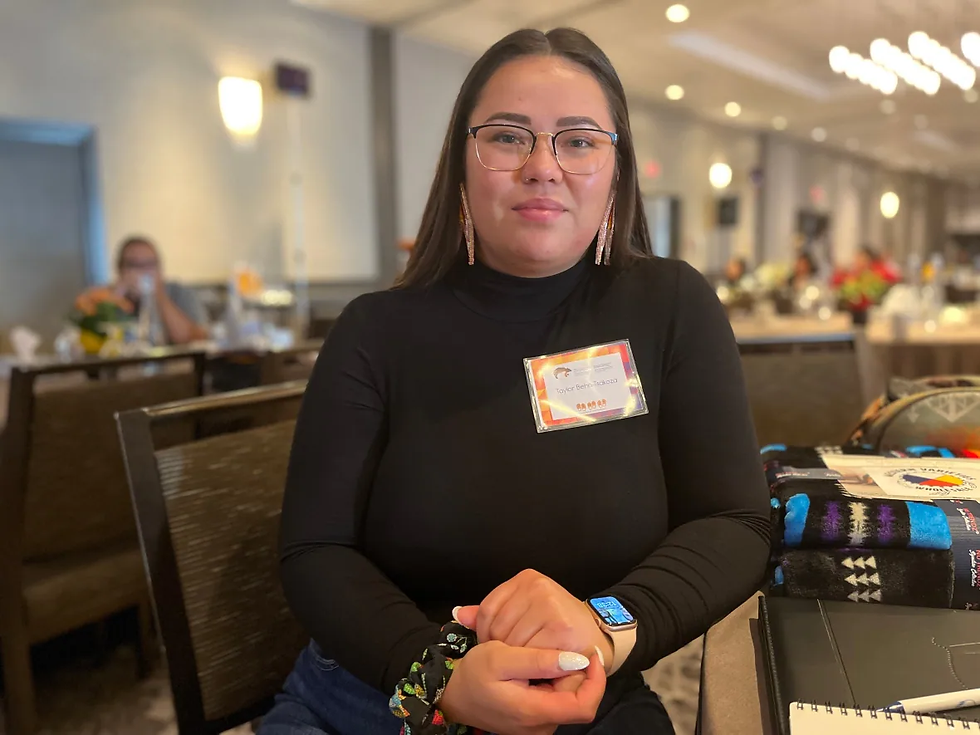'We're still in this process of truth telling ... it's so important for our young people to be there'
Ka’nhehsí:io Deer · CBC News · Posted: Sep 14, 2022 2:57 PM ET | Last Updated: September 14

Benjamin Kucher is a member of the Métis Nation of Alberta and an anthropology student at the University of Alberta.(Ka’nhehsí:io Deer/CBC)
The search for unmarked burials associated with former residential schools is not easy, but it's important for Métis youth Benjamin Kucher to be a part of it.
"There's a heaviness that comes with this work," said Kucher, who is a member of the Métis Nation of Alberta.
"But for me, these searches are a way of healing and reconciling with the past."
Kucher is attending the inaugural National Gathering on Unmarked Burials associated with residential schools this week in Edmonton.
Over 150,000 First Nations, Métis and Inuit children were forced to attend the government-funded schools between the 1870s and 1997.
The National Centre for Truth and Reconciliation, which is the archival repository for all of the material collected by the Truth and Reconciliation Commission (TRC), has documented over 4,000 deaths of children at the schools to date as a part of the TRC's Call to Action 72 to create a national death register and public-facing memorial register.
Not all the deaths listed on the registry include burial records.
Kucher is an anthropology student at the University of Alberta and a research assistant at the Institute of Prairie and Indigenous Archeology. The institute is one of the organizations doing ground-penetrating radar searches at former residential school sites.
Over the past summer, he's visited multiple communities and participated in the searches.
He was one of two youth to address the gathering, which is hosted by the Office of the Independent Special Interlocutor For Missing Children, Unmarked Graves and Burial Sites associated with Indian Residential Schools.
Over 300 First Nations, Inuit and Métis governments, representative organizations, communities, survivors and families are in attendance.
For Kucher, the issue comes down to finding the truth.
"We're committed to this work and committed to finding the truth, finding the answers of what happened to these children, how it happened and who was responsible," he said.

Taylor Behn-Tsakoza, from Fort Nelson First Nation in B.C., was part of the Assembly of First Nations delegation who travelled to the Vatican to speak with Pope Francis. (Ka’nhehsí:io Deer/CBC)
Taylor Behn-Tsakoza, 26, from Fort Nelson First Nation in B.C., expressed similar sentiments. She was a part of the Assembly of First Nations delegation who travelled to the Vatican to speak with Pope Francis.
"We're still in this process of truth telling…. Our communities are also still learning that truth," said Behn-Tsakoza.
"I think that's why it's so important for our young people to be there. I think this is just one truth of many that is still going to come to light in my lifetime."
Behn-Tsakoza was born in 1996, as the last residential schools were closing. She said it's also important for youth to be a part of dialogue and the process of recovering missing children, as intergenerational survivors.
"As a youth, I don't want to take up space from a survivor," said Behn-Tsakoza.
"Although I only know of a life without residential schools… I still feel the effects and suffer the effects of what happened to my family and my community."
The two-day gathering ends Wednesday.
Support is available for anyone affected by their experience at residential schools or by the latest reports.
A national Indian Residential School Crisis Line has been set up to provide support for former students and those affected. People can access emotional and crisis referral services by calling the 24-hour national crisis line: 1-866-925-4419.
Mental health counselling and crisis support is also available 24 hours a day, seven days a week through the Hope for Wellness hotline at 1-855-242-3310 or by online chat at www.hopeforwellness.ca.
